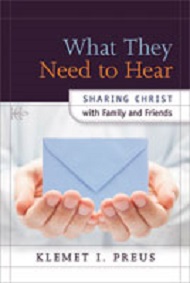 What They Need to Hear is a series of 91 letters that he wrote to his dying father-in-law Lloyd Bingaman during the last 18 months of Lloyd’s life here on earth. Lloyd was a skeptic. After his wife died, he cut ties with his church. He was not hostile toward Christ or the church; he just didn’t think he needed what was being offered. The book is a collection of 91 letters with interspersed commentary on Lloyd’s health and background information on why certain topics were addressed in the letters.
What They Need to Hear is a series of 91 letters that he wrote to his dying father-in-law Lloyd Bingaman during the last 18 months of Lloyd’s life here on earth. Lloyd was a skeptic. After his wife died, he cut ties with his church. He was not hostile toward Christ or the church; he just didn’t think he needed what was being offered. The book is a collection of 91 letters with interspersed commentary on Lloyd’s health and background information on why certain topics were addressed in the letters.
At the beginning of their correspondence Preus addresses Lloyd’s objections to miracles and faith. After four months’ time Preus’ father-in-law began to attend church again, so the focus of the letters changes slightly. Preus addresses the purpose of worship. He uses the Apostle’s Creed to continue the discussions of the way of salvation. Throughout the book the author weaves together apologetic arguments using Scripture to teach the veracity of Scripture in answer to objections. The book ends on a happy note. On Epiphany Sunday, January 6, 2008, Lloyd died and went to heaven.
Preus started the book with some lessons about sharing the gospel. The reader gets to see these lessons interspersed throughout the letters and be able to wrestle with applying them in concrete ways. The lessons are:
“Evangelists speak to one person often.
“Evangelists answer questions.
“Evangelists know that they work better in an environment of trust.
“No matter how unpleasant, true evangelists will always correct false teaching when necessary.
“Risky as it may seem, evangelists learn to speak the Law.
“Evangelists learn to speak what they know of Christ in a variety of ways.” (8-9)
Preus’ apologetic arguments were also fitting and scriptural. He gently used Scripture to prove Scripture and incorporated pertinent sections in his letters. For example, when discussing Jesus’ resurrection and the truth of miracles, he wrote, “The soldiers who lied about the disciples stealing the body of Jesus were “scientifically” convinced that the body was gone. They knew Jesus has been raised; they just preferred money to acknowledging the truth (Matthew 28:11-15). The Jewish leaders who hated Jesus knew that Lazarus had been raised from the dead. They were so convinced that he had been raised, that they were determined to kill Him again if they could (John 12:9-11). It seems to me that the reason they questioned and denied the miracles publicly (for they certainly belied them privately) is that they were not at all dispassionate and objective” (146).
He helped Lloyd to see that the writers of the gospels understood how some might view the claims they made about Christ. It is as if the Holy Spirit anticipated Lloyd’s objections.
His explanation of Lutheran liturgy is an excellent review of why we worship the way we do. He wrote, “Lloyd, I’d also like to tell you about the Invocation, which occurs at the beginning of the Divine Service. We tend to not appreciate the invocation fully. Most services open with a hymn, but the real start of the service is when the pastor says, “The in the name of the Father and of the Son and of the Holy Spirit.” That oft-quoted little phrase occurs only one time in the Bible. Jesus says, “Go therefore and make disciples of all nations, baptizing them in the name of the Father and of the son and of the Holy Spirit.” When you were baptized, these words were spoken. What does Baptism do for us?” (83). He then goes on to explain the importance of baptism and those words for us today.
His use of the Apostle’s Creed also reminded me that our people, who have been taught to know and believe this Creed, can use it to witness to others. It’s a simple, yet powerfully clear tool in our toolboxes.
I would recommend this book with no hesitation. This is a good book for a church library or as part of a Lutheran’s personal devotional material. It can also be used to train members in personal witnessing. During this Epiphany season, we see Christ appear and be proclaimed as “the Lamb of God who takes away the sin of the world” (John 1:29). By God’s grace we can share Christ with family and friends and tell them what they need to hear.
Klemet I. Preus served as a pastor in the LCMS until he was called to heaven in 2014. Readers may recognize him as the author of The Fire and the Staff (CPH 2005)

